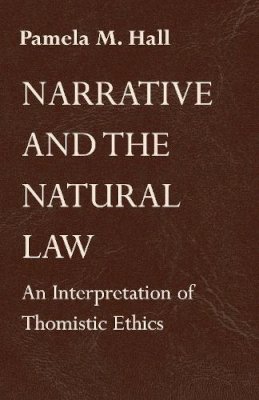
Narrative and the Natural Law: An Interpretation of Thomistic Ethics
Pamela M. Hall
With Narrative and the Natural Law Pamela Hall brings Thomistic ethics into conversation with ongoing debates in contemporary moral philosophy, especially virtue theory and moral psychology, and with current trends in narrative theory and the philosophy of history. Pamela M. Hall’s study offers a solid, challenging alternative to rigid, legalistic interpretations of the substantial discussion of law in Aquinas’s Summa theologiae and defends Aquinas’s ethics from charges of excessive legalism.
Hall argues that Aquinas’s characterization of the content and relationship of natural, human and divine law indicates that his understanding of the quest for the human good is practical, communal, and historical. Hall maintains that natural law, the ongoing inquiry into what is the human good, is narrative both in terms of its internal structure and its being informed by the specific story of Scripture. According to Aquinas the discovery of natural law is enacted historically and progressively within communities and by individuals through a process of practical reasoning. Hall then goes on to show how natural law requires articulation by human law, and how both are connected to divine law (salvation history) as Aquinas understands it. Aquinas represents inquiry into the human good as a kind of historical narrative or story with stages or “chapters”; thus knowledge of natural law requires time and experience, as well as sustained reflection by individuals and by whole communities. Such learning of natural law implies the operation of prudence and the assistance of the moral virtues.
Product Details
About Pamela M. Hall
Reviews for Narrative and the Natural Law: An Interpretation of Thomistic Ethics
